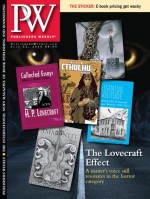It's probably James Frey's fault. Maybe Laura Albert's, too. We can also blame Margaret Jones, Stephen Barrus, and Norma Bagain. And maybe Daniel James and Clifford Irving for getting the whole thing started. For what each taught us by pretending to be, respectively, a truth-telling memoirist; a former teen drug dealer and male prostitute named JT LeRoy; a half-Native American gangbanger who ran with the Bloods; a Navajo named Nasdijj; a witness to an honor killing in Jordan; a Chicano from East L.A.; and a confidante of reclusive billionaire Howard Hughes was that the writer's life toward the end of the 20th and the beginning of the 21st century had become increasingly dull.
Our generation never invaded Normandy, didn't hobble through Spain with our army wounds still unhealed to sip absinthe, didn't fight in 'Nam or drop acid while burning our draft cards. We were a sissy bunch, armed with degrees from liberal arts colleges, M.F.A.s from well-regarded writers' programs. Our trench time was spent as office temps, secretaries in our parents' businesses, baristas, grant writers, teaching assistants. Say what you will about the talents of Jonathan Franzen, Michael Chabon, and Jhumpa Lahiri versus those of Jack Kerouac, 50 years from now still only one will have been the subject of an 800-page biography. Yet here we were, writing in an era obsessed with celebrity and reality shows, where the first question readers and journalists nearly always threw at us was, "How much of this novel was based on your own personal experiences?" At which point we faced the contemporary writer's dilemma—we could be only one of two possible things: a liar or a bore. Could anyone blame us for choosing the former?
But then, even that became well-nigh impossible. In the instant-muckraking era of TMZ, the Smoking Gun, and Gawker, when the outing of any instance of plagiarism became only one Google Books search away, with journalists, editors, and publishers all on the lookout for the next Frey, lying became tougher and riskier than ever.
So we've taken the only reasonable option—taking back what's rightfully ours, casting ourselves in our fiction, allowing ourselves to explore the intense experiences missing from our monotonous existences, while getting to do it in novels, where we still have the right to lie in service of larger truths. Thus, in Beatrice and Virgil, Yann Martel introduces us to Henry L'Hote, a bestselling author having difficulty writing a follow-up to his book about animals, when he encounters a mysterious taxidermist, also named Henry; in Lunar Park, Bret Easton Ellis inserts the notorious author of Less Than Zero and American Psycho into a supernatural thriller worthy of Stephen King, who appears as a character near the completion of his own Dark Tower series; while researching a "crime in Calcutta," Jerry Delfont, Paul Theroux's narrator in A Dead Hand, yet another writer with writer's block, comes in contact with none other than Paul Theroux, a man who never suffered from that debilitating condition. Nobel Prize winners have been playing the game, too; J.M. Coetzee has written about a writer named "Senhor C"; José Saramago gave us his alter ego, "Señor José."
Recently, in my Upper Manhattan apartment, I was working on a novel about a down-on-his-luck writer in Upper Manhattan who wrestles with the tempting idea of putting his name to a fake memoir. The idea was to see how many lies I could tell while still telling a spiritually true story. When I was done with the book, I sought out writers to blurb it. I considered contacting Arthur Phillips, but learned that he was already working on a novel about fakery. I thought of getting in touch with Jonathan Safran Foer or "Jonathan Safran Foer" or Neal Pollack or "Neal Pollack," yet didn't know which one of the four I should seek (why is it that only men seem to be doing this sort of thing?). Instead, I sent an e-mail to Gary Shteyngart, who was then at work on a work of fiction that he has nevertheless called Super Sad True Love Story. Alas, he had already blurbed one of my books, so I asked for a few words from his own alter ego, Jerry Shteynfarb, the lecherous, self-promoting author of The Russian Arriviste's Hand-Job Manual. Mr. Shteynfarb, via Mr. Shteyngart, responded quickly: "This book has many pages and a spine," he wrote. "The font is nice and large. I recommend this book to anyone with failing eyesight." I can't say that these words will do much good for my book, but I can say one thing with confidence—even though their author is fictional, he is certainly telling the truth.
Spiegel & Grau published Adam Langer's The Thieves of Manhattan this week.



 Volume 257
Issue 27
07/12/2010
Volume 257
Issue 27
07/12/2010





